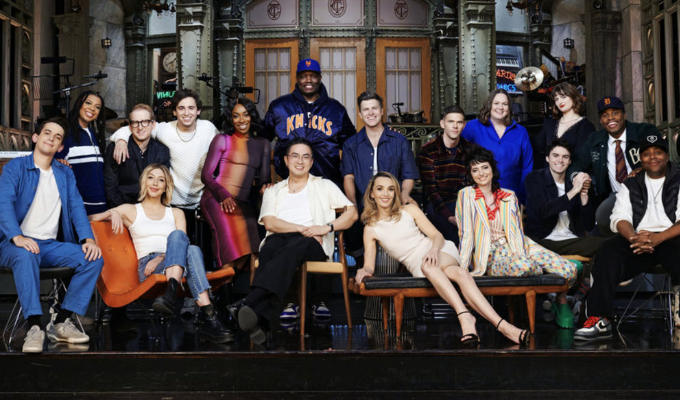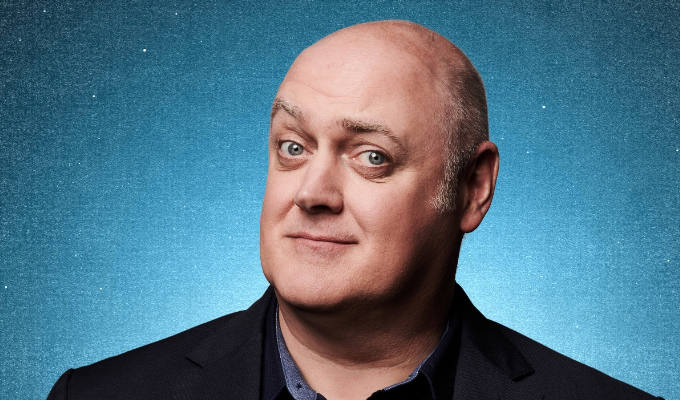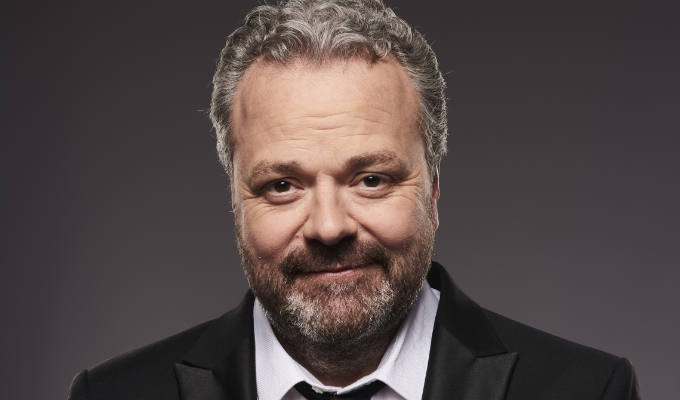 © NBC
© NBC What the British SNL will need: improvisers
Lorcan Mullan continues his look at the possible pitfalls facing the remake
Having previously discussed the issues of how the sketches and the guest hosts might be addressed on Saturday Night Live’s British remake, Lorcan Mullan now turns his attention to the cast…
Before I had ever watched a Saturday Night Live sketch, I was aware of the show by cultural osmosis, given how many stars are among its alumni.
Bill Murray, Eddie Murphy, Julia-Louis Dreyfus, Amy Poehler, and Joe Piscopo are just a small sample of the A-listers that first came to prominence via the show. I think the main reason a lot of people have watched SNL after its first few years has been in the hope they may see a future movie star debut on-screen as an extra in an eight-minute sketch built around a shaky one-joke premise in an episode hosted by Ronda Rousey.
What will make the first round of casting for the British version all the more daunting is the idea that the producers may feel they are trying to find the new Chevy Chase, Dan Aykroyd, Jane Curtin, Gilda Radner and John Belushi.
But SNL doesn’t really make stars of that calibre any more, and that has been the case for more than a decade. There aren’t really any comedy movie stars, except maybe Jack Black, nor are there that many high profile network sitcoms for them to star in and/or showrun like Parks and Rec or 30 Rock. I also don’t expect Seth Meyers or Jimmy Fallon to release their vice-like grip on the late-night talk show desks they currently occupy.
The most recent cast members to reach a higher level of fame, or at least maintain what they already had via SNL, are probably Bill Hader, Jason Sudekis, and Andy Samberg, with their respective shows Barry, Ted Lasso, and Brooklyn Nine-Nine.
This helps explain why Michael Che and Colin Jost have been hosting the Weekend Update segment for more than a decade at this point, longer than any Update anchor by at least two seasons. Many of the other cast members are long-serving, too.
If Bowen Yang had been in SNL in the 90s, he’d have already had two or more lead roles in major studio film releases. The only fault with that theory is that it would have required SNL creator Lorne Michaels casting an Asian-American, which was something he didn’t do until he cast Yang in 2018.
Kenan Thompson was starred in a sitcom back in 2021, but pulled double duty the whole time and stayed on SNL. Thompson correctly assumed the vehicle, Kenan, would probably not be around for long (it lasted 20 episodes). It’s getting to point where there will soon be more seasons of SNL in which Thompson was a member of the cast than not.
Another problem with SNL becoming such an institution is that it turned the comedy industry into something of a closed shop, with only a few routes to becoming full-time comedian. The tiering and pricing structure of improv organisations like Second City seem like something between a pyramid scheme and a cult.
This was something Bojack Horseman brilliantly skewered with Shenanigan, which imagined that L. Ron Hubbard’s Dianetics could have been founded on the premise of "Yes, and…".
Colin Jost feels like the result of an SNL head writer mathematical formula, with his preppy look, Harvard background, and the blandly handsome features of a future centrist Dad. There is a mould that makes many modern American SNL cast members seem so interchangeable. The programme itself skewered this very well in a sketch from the Tina Fey hosted episode entitled New Cast Member or Arcade Fire?
That sketch is eleven seasons old.
While the British SNL probably won’t be producing movie stars, I think there will be a lot of intrigue around this first cast. Hopefully their hiring philosophy will match that of Michaels in 1975 insofar as going after exciting new voices who wanted to shake things up.
I do think that SNL UK should look into the thriving UK improv scene, which has been pathetically underserved on TV. The last two attempts at bringing improv to the masses were eight episodes of Fast And Loose and one episode of Improvisation, My Dear Mark Watson, both released in 2011, and featured very few people who were actually a part of the UK improv scene at the time. For its faults (and I write as a recovering improviser), improv does fit SNL UK’s need to be a highly collaborative effort.
One or two stand-ups should still be cast because they will probably give the show a bit of an edge (in a similar way that the likes of Pete Davidson and Eddie Murphy did) and maybe have a better self-awareness than the world of improv which attracts the exhibitionist nerd crowd that can grate on the public.
However, the talent scouts for SNL need to look far and wide, both live and – and certainly not limit themselves just to the comedy clubs and improv nights of London. Nor should they look for carbon copies of the modern identikit US SNL cast member.
My biggest fear of a knock-on effect of SNL UK being a success is if the Edinburgh Fringe essentially becomes the equivalent of the NFL Scouting Combine, so the only way to have a chance to land yourself audition is to put yourself into huge debt.
Suggestion:
Here’s where I finally mention the elephant in room. The UK already made their own SNL once before.
I guess because they didn’t include Night in the title, and then it for one series to Friday, which meant that NBC had no grounds to sue.
From 1985 to 1988, Channel 4 ran four series of the show. The first followed the guest host format (all figures from the comedy scene, as I recommended in yesterday’s piece), but from series 2 to 4 the hosting duties were taken up by Ben Elton, creating probably his definitive image as a sparkly-suited Tory hater.
Saturday Live’s difference to SNL was that it was formatted as a showcase of the hottest names in the UK comedy scene, rather than a talent incubator for a recurring cast. Rik Mayall and Adrian Edmondson had already made both series of The Young Ones before their regular run in the first series as the Dangerous Brothers. Ben Elton, Stephen Fry, and Hugh Laurie were all also well known and successful comedians before their three years as regulars.
However, Saturday Live did create one huge star in its only other regular performer: Harry Enfield. The path for his success is the blueprint that UK SNL should try to follow as much as possible to make their own stars that people will tune in to watch.
Here’s a crazy fact you might not know. Wayne’s World was born from a character Mike Myers had worked on for years before joining SNL, and would be the centrepiece of two huge movies (only the Blues Brothers comes close to it as far as SNL spin-off films go). From Wayne’s World’s debut sketch in February 1989 to Myers’ departure in January 1995, they produced 19 sketches.
What made Enfield a star were monologues from two characters – Stavros and Loadsamoney. If SNL finds a character that has a similar cultural ring that Loadsamoney did to the Thatcherite 80s, they need to milk that character for all its worth, not save him for irregular appearances like Wayne’s World.
That character should included in every episode in a prominent position, greeted by sincere whoops of excitement from the expectant crowd. SNL UK needs to hook and maintain a large enough audience to have any chance to establish itself as a part of a far more scattered-to-the-wind cultural zeitgeist. For we all still love a good catchphrase.
A four-part guide to making sure the British SNL isn't a flop
Part 1: The sketches
Part 2: The hosts
Part 3: The cast (this article)
Part 4: The expectations
• Lorcan Mullan is more than happy to offer his services as a talent scout and can be contacted via @lorcanmullan.bsky.social
Published: 19 Apr 2025






